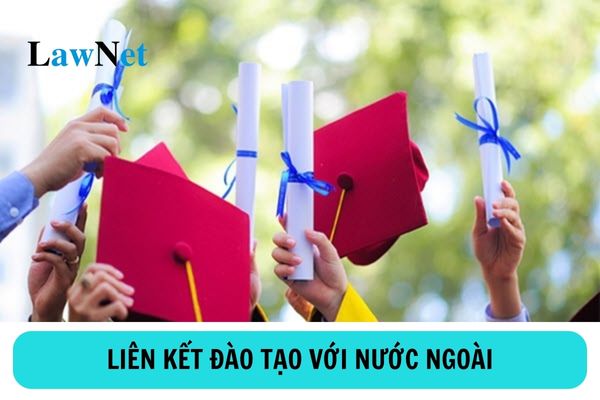What are regulations on joint training with foreign countries of higher education institutions in Vietnam?
What is joint training in higher education in Vietnam?
As stipulated in Clause 2, Article 2 of Decree 86/2018/ND-CP:
Definitions
For the purpose of this Decree, the following terms are construed as follows:
1. “Foreign-invested educational institutions” refer to institutions financed by foreign invested business entities which operate in accordance with the laws of Vietnam and are allowed to use their own seals and accounts.
2. "Short-term training institutions” refer to foreign-invested educational institutions including centers that provide training in foreign languages, IT, cultures and specialized skills, and training institutions established by foreign diplomatic missions and/or international governmental organizations, which are permitted to operate in Vietnam.
3. “Integrated education program” means a Vietnamese education program that is integrated with a foreign education program but still ensures its own objectives and avoids duplicated contents and knowledge.
4. “Joint education” means a form of cooperation between a Vietnamese pre-school or compulsory educational institution and a foreign educational institution in order to deliver an integrated education program.
5. “Joint training” means a form of cooperation between a Vietnamese higher educational institution and a foreign higher educational institution in order to deliver a training program leading to issuance of degrees or certificates without establishing a legal entity.
....
Therefore, joint training in higher education is the cooperation between Vietnamese higher education institutions and foreign higher education institutions.
This aims to implement training programs to issue diplomas or certificates without establishing a legal entity.
 What are regulations on joint training with foreign countries of higher education institutions in Vietnam? (Image from the Internet)
What are regulations on joint training with foreign countries of higher education institutions in Vietnam? (Image from the Internet)
What are regulations on joint training with foreign countries of higher education institutions in Vietnam?
According to Article 45 of the Law on Higher Education 2012 (amended by Clause 25, Article 1 of the Amended Law on Higher Education 2018), the regulations on joint training with foreign countries of higher education institutions in Vietnam are as follows:
- Joint training with foreign institutions is a training cooperation between higher education institutions established in Vietnam and foreign higher education institutions to implement training programs that issue diplomas or certificates without creating a new legal entity. This must comply with the Law on Education 2019 and other relevant laws.
- The joint training program with foreign institutions can be a foreign program or co-developed by both parties.
Training can be conducted entirely in Vietnam or partly in Vietnam and partly abroad.
- Foreign higher education institutions collaborating with Vietnamese higher education institutions must be reputable and quality institutions, authorized by their competent bodies to offer and award degrees in the collaborative field or possess a valid educational quality accreditation certificate issued by a legitimate accreditation organization.
Both parties must ensure the conditions for facilities, equipment, and academic staff meet the program's requirements and are responsible for the program's quality.
- The Minister of Education and Training approves the collaboration scheme with foreign institutions for teacher training and health-related fields after consulting relevant ministries and central authorities; for other fields, the scheme of higher education institutions that do not fall under Clause 5, Article 45 of the Law on Higher Education 2012.
- Higher education institutions that meet the conditions stipulated in Article 45 of the Law on Higher Education 2012 and Clause 2, Article 32 of the Law on Higher Education 2012 are allowed to autonomously collaborate at the bachelor's level; upon achieving accreditation standards at the bachelor's level, they are allowed to autonomously collaborate at the master's level in appropriate fields; and upon achieving accreditation standards at both the bachelor's and master's levels, they are allowed to autonomously collaborate at the doctorate level in appropriate fields.
- If a collaborative training program with foreign institutions is suspended or terminated due to not meeting the conditions stipulated in Clause 3, Article 45 of the Law on Higher Education 2012, the higher education institution must:
+ Ensure the legal rights and interests of lecturers, staff, and students;
+ Reimburse tuition fees to students;
+ Settle teaching remuneration and other benefits for lecturers and staff as per labor contracts or collective labor agreements;
+ Settle tax and other debts (if any).
- Higher education institutions must publicly disclose information related to the collaborative training program with foreign institutions, the legality of foreign degrees awarded in both the issuing country and Vietnam on their official websites and mass media; support students in the degree recognition process; ensure program accreditation is conducted in Vietnam immediately after the first batch of graduates and periodically as prescribed.
- Higher education institutions conducting autonomous collaboration without meeting the stipulated conditions or violating conditions ensuring the quality of the collaborative training program with foreign institutions will be suspended from collaboration activities and are prohibited from autonomous collaboration for 5 years from the date of the competent authority's conclusion on the violation.
Who are eligible for joint training in higher education, Master's, and Doctoral-Level in Vietnam?
Based on Article 15 of Decree 86/2018/ND-CP, eligible entities for joint training in higher education, Master's, and Doctoral-Level in Vietnam are:
- Higher education institutions established and operating lawfully in Vietnam and accredited for educational quality;
- Higher education institutions established and operating lawfully abroad, recognized for educational quality by foreign competent bodies or quality accreditation organizations, and recognized by Vietnamese competent authorities.

